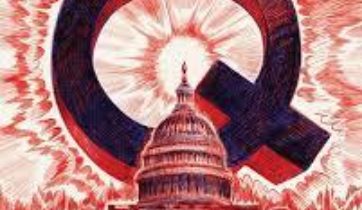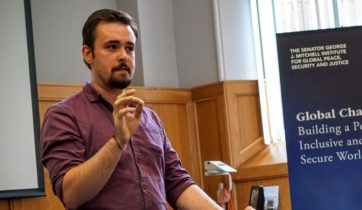
Jack Holloway on the apocalypticism in Ozzy Osbourne's lyrics

Recent and older articles and entries on the Peasants' Revolt

A look at the background to confusion surrounding messianic claims with reference to Dune: Part Two, Monty Python's Life of Brian, and the Gospel of Mark.

“Storm coming, you’d better hide.” So sings Ozzy Osbourne ... They were an apocalyptic band in an apocalyptic time.

Michael Miller discusses Black Hebrew Israelites, Black-Jewish relations, and contemporary antisemitism

With the release of a new recording of Olivier Messiaen's Quartet for the End of Time, written under German captivity in 1940...

The Norman Cohn Lecture 2022 by Peter Geoghegan will take place on 25 May 2022 at 6.30. The theme will be: Dark Money and the Subversion of Global Politics.

James Crossley looks at how John Ball, the apocalyptic priest of the 1381 English uprising, was understood during the English Reformation.
On 24 February 2022, the first day of the Russian invasion of Ukraine, the Times of Israel reported the Ukrainian government ordering the

The Bible and the concept of the Ukrainian nation in the work of the poet-scholar Ivan Franko.

QAnon, JFK Jr, and beliefs about second comings

A number of news outlets have reported that a study by Gaya Herrington, Sustainability and Dynamic Systems Analysis Lead in North and South America...

It was by chance that Theodore Schwartz found himself on Manus Island in 1953-54, in what was then the Australia-governed Manus District of the United Nations Trust Territory of Papua and New Guinea, among people engaged in an intense millenarian effort.

On 22nd February 2021, the Scottish Sun newspaper carried a report on the UK version of the TV gameshow "Who Wants to be a Millionaire" under the headline: "Scots contestant STUNNED as sis gets tough Bible question

The event epitomised the confluence of conspiracy culture, growing authoritarianism, and reactionary white Christianity in American political and public life...

James Crossley looks at how labels like 'apocalypticism' are applied in popular and academic discourse.

When countries began to face the prospect of a COVID 19 lockdown sometime in March, western experts—many of them well-meaning—prophesied a disaster for Africa.

Jehovah’s Witnesses responded to the coronavirus before government restrictions came into force. House-to-house visits were suspended, and literature carts were no longer to be displayed in towns and cities.

Recent months have seen an increasing media visibility for a movement which has existed for more than a century, but previously was little talked about. Commonly known as Black Hebrew Israelites (BHI), or simply Hebrew Israelites...

A round-up most compelling cinematic interpretations of apocalyptic themes, by Lynne Moss Bahr.

Bill McGuire on the climate catastrophe facing the planet

James Crossley looks at how religion and violence are presented in contemporary English political discourse with reference to the recent controversial rejection of asylum based on the Bible

Discussion of the Twelve Tribes, also known as the Messianic Communities, founded by Elbert Spriggs and his wife, Marsha, in the USA in the early 1970s.

Jason King discusses the use of biblical apocalypticism to address environmental themes in the popular US children's TV show Mister Rogers' Neighborhood.

Sarah E. Rollens looks at the significance (or otherwise) of apocalyptic thought in Christian origins, the transmission of the earliest traditions about Jesus, and 'Q'.

Christina Petterson discusses apocalypticism among the Moravian Brethren and the ideas of Nicolaus Ludwig von Zinzendorf (1700-1760).

Sean Durbin looks at the world of American Christian Zionism and the pastor and televangelist, John Hagee

Damian Cyrocki provides an overview of the Mariavites and the use of the Bible in their claims about the kingdom of God.

In America, apocalyptic and millenarian language is most prominently found on the political and Christian right. While hardly absent from the English right, such language is more likely to be utilised on the left. Indeed, the English radical tradition has had a long history of apocalyptic and millenarian thinking, if by those problematic terms we mean the recurring assumptions about dramatic overhaul of society.

"Avant-garde art has long been considered a bastion of secularity, holding strong against the creeping return of religion in contemporary culture."

"He was to claim that after fourteen weeks of self-abasement, fasting and prayer the Lord came upon him in power, overwhelming his wisdom and understanding, smiting him dumb, blind and dead in the presence of hundreds of people."

"In an email several years ago, roboticist Hans Moravec wrote to me that he was too busy making the future happen to have time to talk about it..."

"The 39 remaining members videotaped their goodbye messages before swallowing phenobarbital pills."

"All around the world, there is evidence that a deepening crisis is affecting our planet, namely Capitalism..."

"Africa shares a deep history with Europe and one of the direct consequences was the spread of Christianity."

"Earlier this year a report from the Proceedings of the National Academy of Sciences (PNAS) claimed that a ‘sixth mass extinction event’ was not a future projection, but a present reality..."

"When Columbus was discovered on a Caribbean beach, he might as well have carried a placard announcing the end of the world..."

"The concept of the Alt+R has become familiar with the ascendency of Donald Trump to the office of the President of the United States. The need for an alternative to the political and economic status quo is felt on all sides of political persuasions..."

"It’s fair to say that many professional historians have something of a love/hate relationship with historical fiction..."

"...All of them have produced second-generation adults with remarkable childhood tales of involvement in Endtime drills and Millenarian activities."

"...in common parlance ‘Apocalypse’ has come to be synonymous with catastrophe or the end of the world."